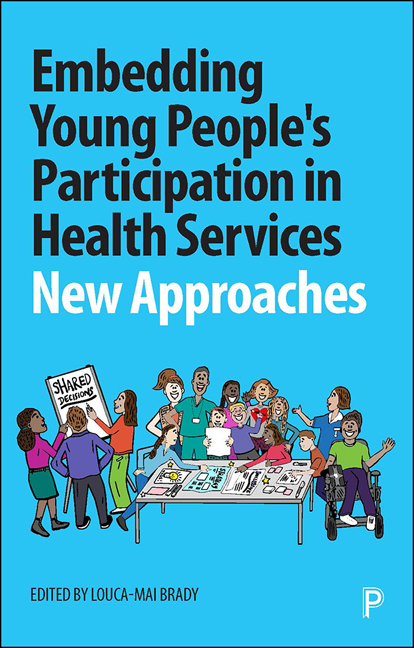Book contents
- Frontmatter
- Dedication
- Contents
- List of Boxes, Figures and Tables
- Summary
- Notes on Contributors
- Acknowledgements
- Foreword
- Introduction: Embedding Young People’s Participation in Healthcare
- PART I Young People’s Participation in Individual Decision-Making
- PART II Participation in National Projects and Programmes
- PART III Collaborative Research in NHS Services
- PART IV Young People-led Participation
- Index
3 - ‘Giving Young People a Voice’: Lessons from the NHS England Youth Forum
Published online by Cambridge University Press: 25 February 2021
- Frontmatter
- Dedication
- Contents
- List of Boxes, Figures and Tables
- Summary
- Notes on Contributors
- Acknowledgements
- Foreword
- Introduction: Embedding Young People’s Participation in Healthcare
- PART I Young People’s Participation in Individual Decision-Making
- PART II Participation in National Projects and Programmes
- PART III Collaborative Research in NHS Services
- PART IV Young People-led Participation
- Index
Summary
Introduction
Young people want to be involved in the decisions that impact on them and their health service provision (Royal College of Paediatrics and Child Health [RCPCH], 2017) – a youth forum is one way of enabling this. This chapter will initially focus on the background and development of youth forums/ councils; secondly, an overview of the National Health Service England Youth Forum (NHSEYF) will be provided with the perspectives of Kath Evans (Experience of Care Lead, NHS England (NHSE) – Maternity, Infants, Children and Young People) and NHSEYF members being integrated. Thirdly, an evaluative mixed methods study (undertaken by the University of Hertfordshire (UH)) will be briefly presented. Finally, the chapter will present the Youth Forum Wheel (YFW) that was developed as a direct result of the research; the YFW is offered to health professionals and young people who may be implementing and/or managing youth forums. It aims to provide insight into the underpinning components of success, each of these will be discussed and their practical application considered.
The development of youth forums
A youth forum has been described as being in existence to:
represent the views of young people, giving young people the opportunity to have a voice, discuss issues, engage with decision makers and contribute to improving and developing services for young people. (NHS England, 2015a, p 5)
One of the longest running youth forums that is widely recognised within the UK is the Northern Ireland Youth Forum which was established in 1979 by the Department of Education; this organisation has continued to develop and has a very active membership (Northern Ireland Youth Forum, 2019). In 1999, a youth forum was held in The Hague to enable 132 young people, representing 111 countries, to offer their thoughts and opinions on a range of key organisations (including the United Nations, as well as governmental and non-governmental bodies) about areas such as health, human rights and education (Youth Forum, 1999). In the same year, UNESCO introduced their first youth forum event – this has since been held every two years at the headquarters in Paris; it is open to all young people and aims to provide:
an innovative, ongoing opportunity for youth to work in dialogue with UNESCO, to shape and direct the Organization's approach and to present their concerns and ideas to Member States. (UNESCO, 2019)
- Type
- Chapter
- Information
- Embedding Young People's Participation in Health ServicesNew Approaches, pp. 77 - 104Publisher: Bristol University PressPrint publication year: 2020

